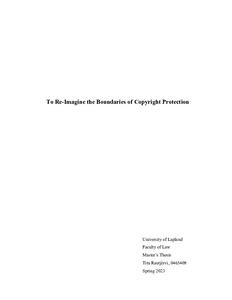To re-imagine the boundaries of copyright protection
Rautjärvi, Titu (2023)
Rautjärvi, Titu
2023
Julkaisun pysyvä osoite on
https://urn.fi/URN:NBN:fi-fe2023032232830
https://urn.fi/URN:NBN:fi-fe2023032232830
Tiivistelmä
Copyright protection has, throughout its 200 year journey, been a divisive topic. Simultaneously too strong yet too weak, never enough to satisfy the needs of both the rightsholders and the public. Regulating the ever developing creative field has proven to be a difficult challenge, further aggravated by the shift into the digital online environment, where previously solid boundaries began to waver and shift. And in that online environment copyright protection has found in ‘piracy’ its most resilient opponent.
This thesis aims to begin the process of re-imagining these boundaries of copyright protection by reflecting on their 200 year journey and the call for ever stronger protection, through one of the latest expansions to their scope, the 2019 CDSM-Directive. Through this journey it is revealed that these modern boundaries are built on an inherently unequal and unbalanced foundation that stands to be rebuilt, re-imagined, into something new. This rotten foundation has too long enabled the unfair exploitation of authors and the global South in the name of a profit oriented economic model that is both unsustainable and unethical. To re-imagine these boundaries means to elevate and honor fundamental rights, moral rights, the author and the pursuit of innovation on a global scale and to even re-evaluate ‘piracy’. Lest a bell will toll on creativity.
This thesis aims to begin the process of re-imagining these boundaries of copyright protection by reflecting on their 200 year journey and the call for ever stronger protection, through one of the latest expansions to their scope, the 2019 CDSM-Directive. Through this journey it is revealed that these modern boundaries are built on an inherently unequal and unbalanced foundation that stands to be rebuilt, re-imagined, into something new. This rotten foundation has too long enabled the unfair exploitation of authors and the global South in the name of a profit oriented economic model that is both unsustainable and unethical. To re-imagine these boundaries means to elevate and honor fundamental rights, moral rights, the author and the pursuit of innovation on a global scale and to even re-evaluate ‘piracy’. Lest a bell will toll on creativity.
Kokoelmat
- Pro gradu -tutkielmat [4969]
